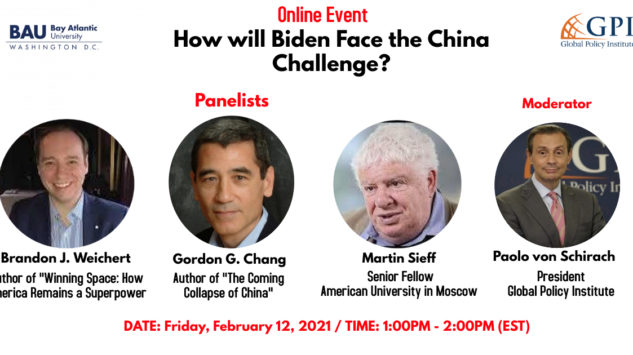Events

Containing China?
On February 12 Bay Atlantic University and the Global Policy Institute held a joint webinar titled:
How Will Biden Face the China Challenge?
There is every indication that the heavy turbulence which affected US-China relations under President Trump will continue under the new Biden administration. From trade and intellectual property rights disputes to the mistreatment of Muslim minorities in China, from repression in Hong Kong to veiled threats to Taiwan and South China Sea expansionism, there are significant points of friction and open disagreement between Washington and Beijing. Early signs would indicate that President Biden and his national security and foreign policy teams will seek allies in their effort to stop China’s hegemonic ambitions. Are they working on a long term “China Containment” strategy? If so, will it work?
Chang pointed out that China’s authoritarian, top-down system is at the same time a major strength and weakness for Beijing. Strength because it allows the Communist Party leaders to deploy all the resources they wants for the furthering of their global goals. Weakness because it allows for huge, unchecked mistakes and dangerous overreach. Coming to the US, Chang noted that America has vastly superior assets. But it lacks full awareness of the systemic danger posed by China. Our free society, a major asset in most respects, becomes a weakness because an open system is fragile and cannot be easily protected from covert, malicious actions.
Weichert noted that one of the key arenas in which this global confrontation will be played out is R&D in science and technology. The US will have to redouble its efforts to keep its leadership position in the key technologies of the future, while redesigning supply chains for many strategic products away from China. Weichert observed that the Chinese are busy stealing all the technical information they can get, while trying to lure US scientists to go to China with the promise that in China they will have all the resources they need to further their research endeavors. Sieff noted that, as this global US-China confrontation unfolds, clear eyed Washington leadership will have to play a key role. While elites may be more aware of the dangers posed by China, Sieff noted, most Americans are not. This could be an area in which Vice President Harris could take the lead in articulating a needed public message aimed at pointing out the systemic risk posed by China. All panelist agreed that we are still missing a coherent China Message coming from Washington. We need the modern equivalent of a “Sputnik Moment” which spurred the US Government to articulate policies aimed at promoting science and technology studies in order to beat the Soviets in innovation during the Cold War, or something like President Kennedy’s 1962 “Moon Shot” speech in which he outlined a vastly enlarged US space program that would soon lead to the most ambitious goal of a US manned Moon mission.
Event Recording: